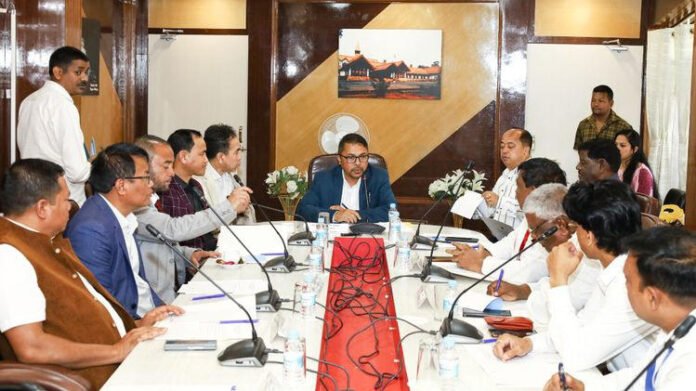Meghalaya recently played host to a delegation from the Jharkhand Legislative Assembly. The visit, marked by cordial meetings, vibrant discussions, and field interactions, aimed at fostering a knowledge-sharing environment where legislative practices, governance models, and policy implementations could be exchanged for mutual benefit.
The knowledge exchange initiative, which took place in Shillong, is being hailed as a crucial move towards deepening federal cooperation and enabling states to learn from each other’s successes and challenges.
A Delegation with a Mission
Led by senior legislators and accompanied by assembly officials, the delegation from Jharkhand included members from various political parties. Their objective was to study Meghalaya’s legislative procedures, committee systems, and public engagement practices. The focus areas included tribal welfare legislation, rural governance frameworks, and environmental conservation — sectors where Meghalaya has carved a notable presence.
Welcoming the delegation, Meghalaya Speaker Thomas A. Sangma emphasized the importance of such exchanges in a federal democracy. “We believe in learning from each other. Each state has unique strengths, and through this engagement, we can grow collectively,” he said during the inaugural session held at the Meghalaya Legislative Assembly.
Legislative Insights and Institutional Visits
As part of the visit, the delegation observed a live session of the Meghalaya Assembly, gaining insights into the state’s debate formats, question hour procedures, and committee operations. They were briefed by senior legislative officers on how Meghalaya handles issues related to customary laws, Sixth Schedule provisions, and integration of local governance systems with mainstream parliamentary processes.
In particular, the delegation showed keen interest in the functioning of the District Councils under the Sixth Schedule of the Constitution — a unique feature of Meghalaya’s governance model that allows significant autonomy to tribal communities.
“We are impressed by how Meghalaya blends tradition with modern governance,” said Pradeep Yadav, a senior legislator from Jharkhand. “This is something that can be adapted to suit the needs of Jharkhand’s tribal regions as well.”
Discussions on Climate and Indigenous Rights
Environmental governance emerged as a key theme during the visit. Meghalaya officials presented various state-led initiatives on forest conservation, water resource management, and community-based biodiversity protection. The Jharkhand lawmakers, hailing from a state equally rich in natural resources, discussed the challenges of balancing development with environmental preservation.
Additionally, both sides exchanged views on the rights of indigenous communities, mining regulations, and land rights — critical concerns in both states with significant tribal populations.
Cultural Exchange and Local Engagement
Beyond legislative matters, the visit also included cultural immersion and grassroots-level interactions. The Jharkhand delegation visited traditional Khasi villages, interacted with local headmen (Rangbah Shnongs), and participated in cultural programs showcasing Meghalaya’s rich heritage.
“This visit has not only enriched our legislative understanding but also brought us closer to the people and culture of Meghalaya,” said another member of the delegation, highlighting the human aspect of inter-state collaboration.
Strengthening Federalism Through Dialogue
Both Meghalaya and Jharkhand have expressed commitment to continuing such exchanges in the future, possibly through a structured “Legislative Exchange Program” that can be institutionalized among Indian states. The idea is to promote a culture of cooperative federalism where states are not in competition but in conversation.
Chief Minister Conrad K. Sangma, who met the delegation during a courtesy call, endorsed the initiative, stating, “This is what strengthens our democracy — when lawmakers from different regions come together to share, learn, and inspire one another.

